Why Putin’s legacy is the world’s cheapest stockmarket
There are good reasons for foreign investors to be nervous about Russia. But there are also reasons for cautious optimism about its future, says Frédéric Guirinec.
Get the latest financial news, insights and expert analysis from our award-winning MoneyWeek team, to help you understand what really matters when it comes to your finances.
You are now subscribed
Your newsletter sign-up was successful
Want to add more newsletters?

Twice daily
MoneyWeek
Get the latest financial news, insights and expert analysis from our award-winning MoneyWeek team, to help you understand what really matters when it comes to your finances.

Four times a week
Look After My Bills
Sign up to our free money-saving newsletter, filled with the latest news and expert advice to help you find the best tips and deals for managing your bills. Start saving today!
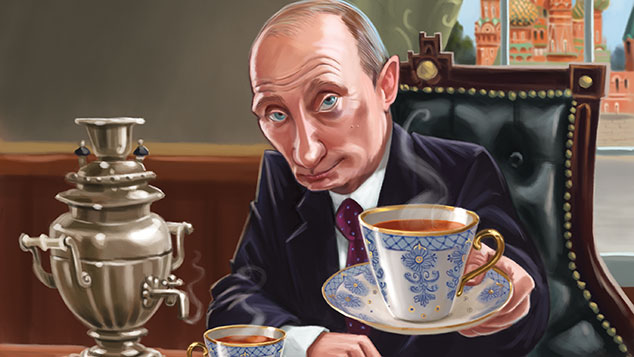
There are good reasons for foreign investors to be nervous about Russia. But there are also reasons for cautious optimism about its future, says Frdric Guirinec.
This weekend many Russians will welcome the new year for the second time in a fortnight. While the country officially starts the year with the New New Year public holiday on 1 January along with the rest of the word, the Old New Year on 14 January which is 1 January on the old Julian calendar is still widely celebrated as an informal holiday. The Eastern Orthodox Christmas lies between the two new years, on 7 January.
If that sounds slightly perplexing, you could take it as a metaphor for how Russia's very different cultural traditions and history make it difficult for Western investors to understand. Is it a faltering economy, overly dependent on oil and commodities, with a capricious and autocratic government that makes it essentially uninvestable? Or is it a relatively successful and powerful economy, headed by the leader its people want, with a stockmarket trading more cheaply than it should?
MoneyWeek
Subscribe to MoneyWeek today and get your first six magazine issues absolutely FREE

Sign up to Money Morning
Don't miss the latest investment and personal finances news, market analysis, plus money-saving tips with our free twice-daily newsletter
Don't miss the latest investment and personal finances news, market analysis, plus money-saving tips with our free twice-daily newsletter
When the future looked brighter
Before considering Russia today, let's remember how it looked not that long ago. In the early 2000s the Russian economy was growing by 8% per year, albeit driven mainly by commodities. After decades of communism, followed by the Wild West period after the Soviet Union collapsed in the 1990s, the country seemed to be back on track with a new young leader, Vladimir Putin, who had been elected in 2000.
Its future looked robust at a time when commodities prices were soaring. Russia has an abundance of natural resources that represents nearly a quarter of GDP. There was even vague if unlikely talk that Russia might join the North Atlantic Treaty Organisation (Nato) and the European Union (EU), and slightly more plausible discussion of closer cooperation.
There were worries over the rule of law most notably the seizure of oil company Yukos and the prosecution of two of its majors shareholders on charges that appeared to be at least partly motivated by political opposition to Putin. But Russia seemed too big an economy for investors to ignore in every respect and still is in many ways. Russia stretches across 11 time zones from the Baltic shores of Kaliningrad to the docks of Vladivostok.
It has a population of 148 million and a GDP of $1.3trn (the 12th-biggest economy in the world). As the successor to the Soviet Union, it remains a major military and technological power, being one of only three nations to launch manned space flights.
Yet relations between Russia and the West began to deteriorate towards the end of the last decade, with the turning point being Russia's invasion of Georgia in August 2008 in support of the breakaway regions of Abkhazia and South Ossetia. From the perspective of the US, the UK and their allies, Russia was attempting to exert influence in neighbouring countries that it regarded as being part of its sphere of influence (principally those that had been part of the USSR or the Warsaw Pact).
From the Russian perspective, of course, there is a different way to see this: the US was provocatively encouraging the eastwards expansion of Nato in an attempt to prevent the reemergence of a strong Eurasian force that would challenge its preeminence. The rights and wrongs of this and Russia's other actions outside its borders don't matter much for our purposes. What's important is the outcome: relations with countries such as the US and the UK began to cool markedly.
Relations between Russia and other countries, such as France and Germany, remained more cordial in many respects (many Anglophones tend to overlook the fact that many major European powers have a different attitude to Russia the West is not a united entity in this respect). However, these also steadily worsened after 2014, when Russia began military incursions into Ukraine a country split between a pro-Russian east and a pro-European west.
This culminated in the invasion of Crimea, a highly strategic region that is home to the Sevastopol military base (leased to Russia until 2042 and home to its Black Sea Fleet), along with ongoing support for rebel forces in eastern Ukraine. At that point, the new cold war became something of a hot peace.
The edge of a crisis
Russia's moves led to the country becoming more isolated from the West. The US and EU imposed sanctions on powerful Russian individuals and major businesses. Russia responded with its own sanctions against its opponents, such as stopping imports of agricultural goods. All this took place at a time when the oil price was collapsing, to below $40 per barrel at one point in 2015. The combination of the two hit the Russian economy hard and triggered a collapse in the rouble, from RUB35 per dollar to RUB80.
Inflation rose by almost 13%; foreign direct investment by over 70%, from $22bn the previous year to $6.5bn. The Bank of Russia, headed by Elvira Nabiullina, was forced to increase interest rates temporarily to 17%. That stopped the collapse of the currency, but put further pressure on a struggling economy. Hence GDP shrank by 2.8% in 2015 and 0.2% in 2016.
At the time, it appeared as if a major crisis was possible but Russia got through the storm. The economic outlook is improving steadily: GDP is estimated to have grown by 1.9% in 2017. Inflation has dropped to its lowest level since 1991 at 2.7% last quarter, while unemployment stands at only 5.3%. The rouble has recovered to around RUB56 per dollar and its prior collapse has even had a positive effect on certain export-oriented industries.
Monetary policy is being cautiously eased to support growth. The banking system, which has long been associated with corruption and money laundering, is in better shape than it was: since 2014, the central bank has shut or restructured over 300 banks, nearly a third of total banks in Russia. Recently it nationalised Otkritie, the seventh-largest bank by assets, amid concerns about its loan portfolio, and shortly afterwards took over B&N, the 12th-largest. Analysts expect many more to be closed.
The case for reform
So the Russian economy appears to be on a bit of an upswing but the reality is that a lot more is needed. This is not a well-balanced economy. The Moscow region contributes a large share of the country's GDP and many small cities are "monotowns" that depend on a single industry or activity. The World Bank ranked Russia 35th in terms of ease to do business, from 123th six years ago, and Putin has said that he wants the country to be in the top 20.
That's a laudable goal, but sceptics point out that the ratings can be misleading, with their focus on formal barriers rather than other factors and that Russia does less well on these. For example, corruption remains high: Russia was ranked 131st out of 176 by Transparency International, a non-governmental organisation that monitors global corruption.
An example of the scale of the problem: a senior anti-corruption official was arrested in September 2016 after the discovery of RUB8.5bn (£110m) in cash at a flat linked to him. Economic reforms, such as privatisation or restructuring of state-run firms and a stronger rule of law, are needed. The question is whether the man who matters will deliver them.
An election that won't surprise
In the absence of some shock incident, Putin will win a fourth official term in office in the presidential election in March. (He stood down in 2008-2012 to comply with constitutional term limits and served instead as prime minister but it was clear that he, not his successor Dmitry Medvedev, remained the top man.)
He remains popular with many voters, while others see little alternative. When I meet "Natalia" a typical younger voter to discuss the elections, for example, she regrets the "controlled democracy" and persecution of opponents such as Alexei Navalny, but feels that voting won't change anything. Hence voter participation is low, barely reaching 30% in Moscow and St Petersburg.
TV celebrity and socialite Ksenia Sobchak "is unlikely to offer a constructive alternative" her role is to draw more attention to the campaign, says Natalia, showing more interest in her diamond ring (presumably from mines run by state diamond firm Alrosa) than the election.
The three main political parties include United Russia (associated with Putin, although he will officially run as an independent), the Communist party (the main left-wing opposition, led by Gennady Zyuganov) and the Liberal Democratic Party, whose name is entirely misleading (it is headed by the controversial nationalist Vladimir Zhirinovsky). None of these, nor smaller parties such as Civic Platform, A Just Russia and Rodina, offer effective opposition.
Navalny proposes to tackle social inequality, which would create a stronger middle class and benefit the Russian economy. He is an attractive figure to the Western media, but it is questionable whether he has a coherent set of policies that would be an improvement on Putin. ("Navalny, like Garry Kasparov, the former chess champion, is good at pointing out issues but doesn't have any plans beyond criticism of the current government," thinks Natalia.)
However, the reality is that it doesn't matter for now: in 2013, he was convicted of fraud and is consequently barred from running as a candidate in the election. (Critics of Putin say the charges were political motivated.)
Looking for a legacy
So Putin will run Russia until 2024 and perhaps beyond, since there is talk of amending the constitution to allow him to remain in power once this term is complete. So will he ever embark on the reforms that might reshape the economy?
In recent speeches, he has indicated the desire to do so, but the situation is complex. Reportedly, Putin is more focused on geopolitical issues than in details of domestic policy. He still makes or vetos major measures (attempts by finance officials to force big state-controlled firms to pay larger dividends are routinely foiled because those who run them appeal to Putin for exemptions), but many decisions appear to be made or fought over by others.
There is a long-running battle between reformists (such as Putin's economic adviser Alexei Kudrin), and those who run the state-owned firms (such as Igor Sechin of Rosneft). One can find reasons for cautious optimism such as the fairly free hand that the central bank had in managing the recession and restructuring the banking system but the outcome is unclear. Investors need to assess investments in Russia on whether they are still cheap if not much changes.
Cheap stocks that aren't always a bargain
The Moscow stockmarket is the cheapest in the world, on a cyclically adjusted price/earnings ratio (Cape) of 5.6, compared with around 15 for the UK and over 30 for the US. A closer look will explain why it's so cheap: the index is dominated by three state-controlled companies: Gazprom, Sberbank and Lukoil, together representing over 40%.
Many other large firms are also controlled by the state or by well-connected oligarchs who mostly built their empires in the privatisations of the 1990s. These firms typically carry political risk and exposure to highly cyclical industries. Some pay sizeable dividends, but minority shareholders should have no illusions that they rank low in the pecking order.
However, there are some cheap firms that are less closely tied to government-friendly executives (which is a benefit for investors due to the risk of sanctions targeting these individuals and companies), are outside of strategic sectors, or are sometimes overlooked. Notably, the sanctions stopping the import of many foods from Europe and the US have created opportunities for food producer Ros Agro (London International: AGRO), which produces pork, vegetable oils and sugar.
The firm had a healthy 14% Ebitda margin (earnings before interest, tax, depreciation and amortisation) in the first half of 2017 and has hardly any debt. It trades on 9.4 times forecast earnings and yields 4.7%. Meat producer Cherkizovo (London Int'l: CHE) saw year-to-date revenues rise 12% and generated a 17.7% Ebitda margin. It trades on nine times forecast earnings and yields 5.4%.
Hunting for value
Value investors with an appetite for risk could look at Sistema (London Int'l: SSA), a conglomerate that recently settled a long-running dispute with state-controlled oil firm Rosneft. The case had poisoned the Russian business climate since 2014 and the resolution may now lead to improving sentiment. Buying Sistema lets investors get exposure to MTS, the largest Russian mobile operator, as well as other assets that it can monetise (it recently floated toy retailer Detsky Mir). Megafon (London Int'l: MFON), the third-largest telecoms firm, has also been beaten down amid rising competition, and looks cheap.
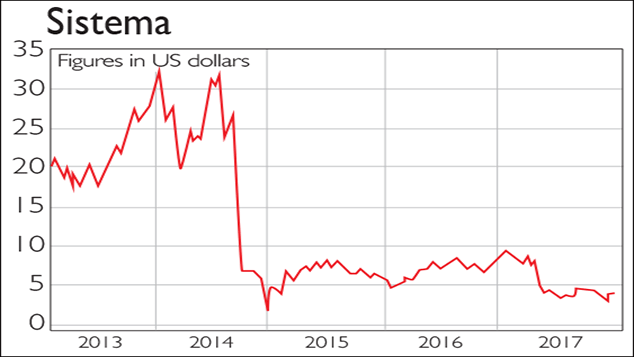
Lower inflation and rising salaries should benefit the middle class, helping retailers. Magnit (London Int'l: MGNT) recently raised $700m to fund growth, leading to a fall in the share price. It trades on 20 times forecast earnings and yields 4.1%.
X5 Retail (London Int'l: FIVE), on a forecast p/e of 18, hasn't paid a dividend but last year adopted a policy targeting a payout of 25% of earnings, so it may initiate one this year. O'Key's (London Int'l: OKEY), which was hard hit by the recession, has agreed to sell its supermarkets to X5 and will focus on smaller stores. Earnings should rebound. Finally, Etalon (London Int'l: ETLN) is one of the largest real-estate developers. It is recording a strong year and has good prospects.
Get the latest financial news, insights and expert analysis from our award-winning MoneyWeek team, to help you understand what really matters when it comes to your finances.
Frederic is an investment analyst. He started his career at JP Morgan in Paris. He has more than ten years of experience investing in private equity and also worked with the 3i debt management team investing in private debt. He is an ACCA member and a CFA charterholder. He graduated from Edhec Business School.
-
 Should you buy an active ETF?
Should you buy an active ETF?ETFs are often mischaracterised as passive products, but they can be a convenient way to add active management to your portfolio
-
 Power up your pension before 5 April – easy ways to save before the tax year end
Power up your pension before 5 April – easy ways to save before the tax year endWith the end of the tax year looming, pension savers currently have a window to review and maximise what’s going into their retirement funds – we look at how
-
 No peace dividend in Trump's Ukraine plan
No peace dividend in Trump's Ukraine planOpinion An end to fighting in Ukraine will hurt defence shares in the short term, but the boom is likely to continue given US isolationism, says Matthew Lynn
-
 Investors need to get ready for an age of uncertainty and upheaval
Investors need to get ready for an age of uncertainty and upheavalTectonic geopolitical and economic shifts are underway. Investors need to consider a range of tools when positioning portfolios to accommodate these changes
-
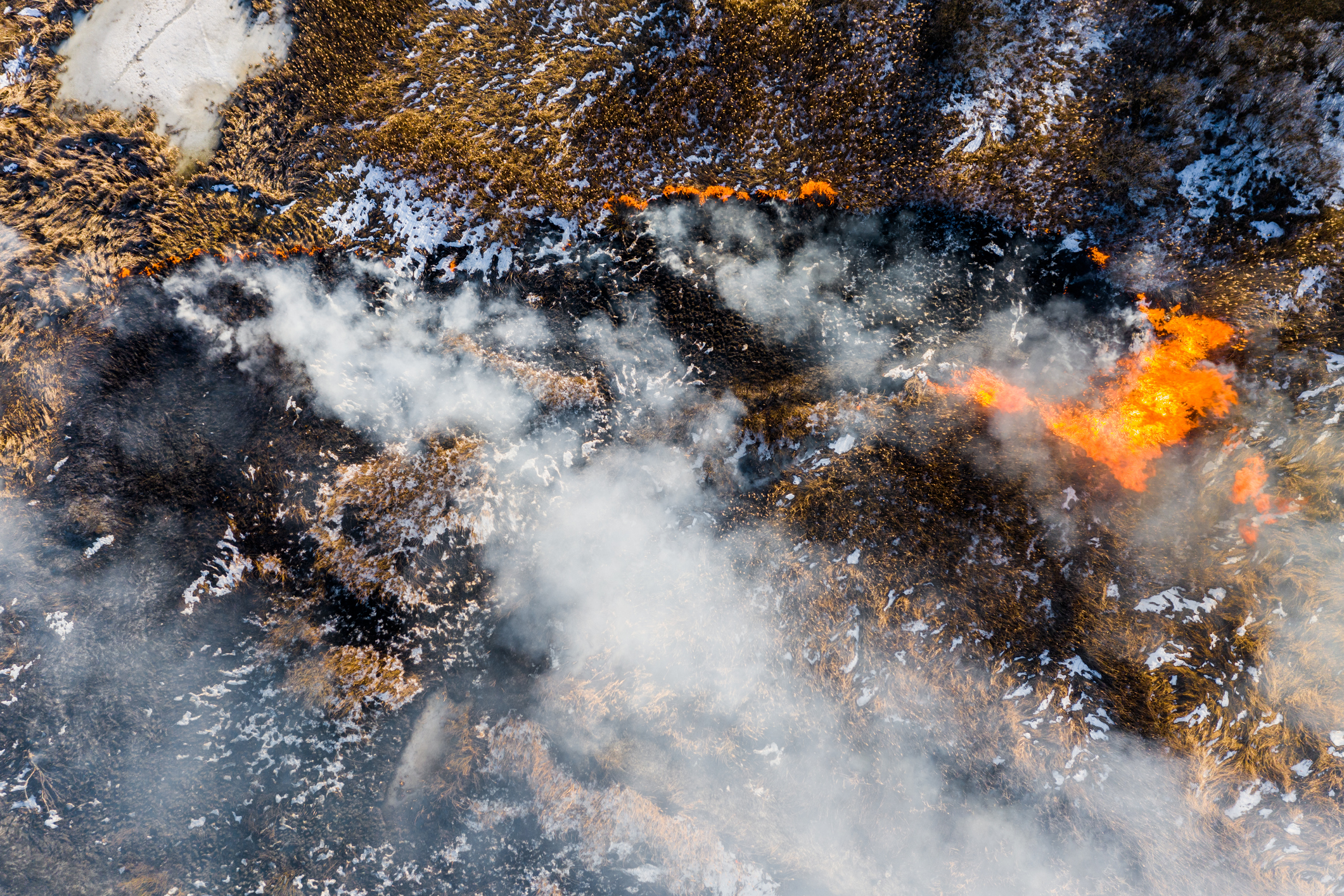 Ukraine invades Russia – what are the political implications?
Ukraine invades Russia – what are the political implications?Ukraine's surprise invasion into Kursk could change the course of the war politically
-
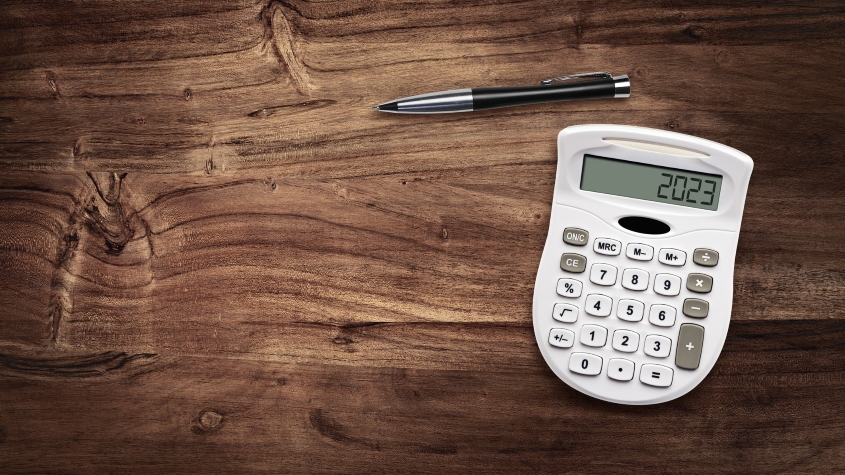 What’s in store for the UK economy in 2023?
What’s in store for the UK economy in 2023?Advice The UK economy is facing a lot of problems right now. What are the main challenges and how will these affect the economy in the year ahead?
-
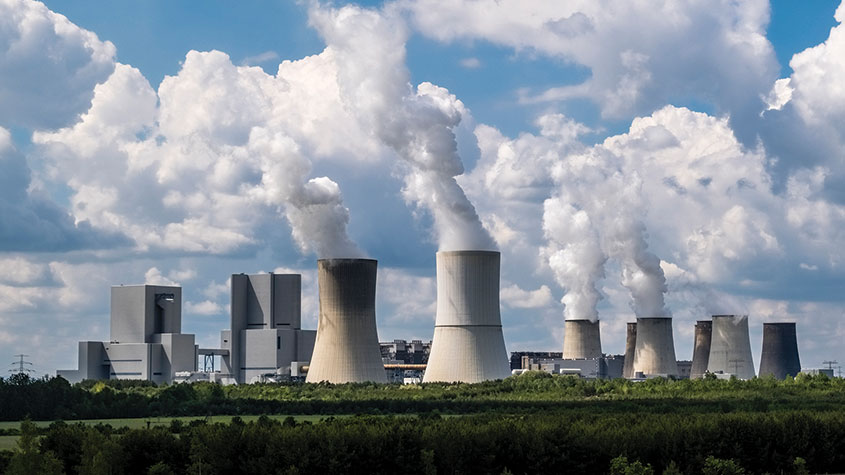 Eurozone economy heads for paralysis
Eurozone economy heads for paralysisNews Record high energy prices, the threat of recession in Germany and squabbling in Italy's government has left the eurozone fighting fires on all fronts.
-
 Governments will sink in a world drowning in debt
Governments will sink in a world drowning in debtCover Story Rising interest rates and soaring inflation will leave many governments with unsustainable debts. Get set for a wave of sovereign defaults, says Jonathan Compton.
-
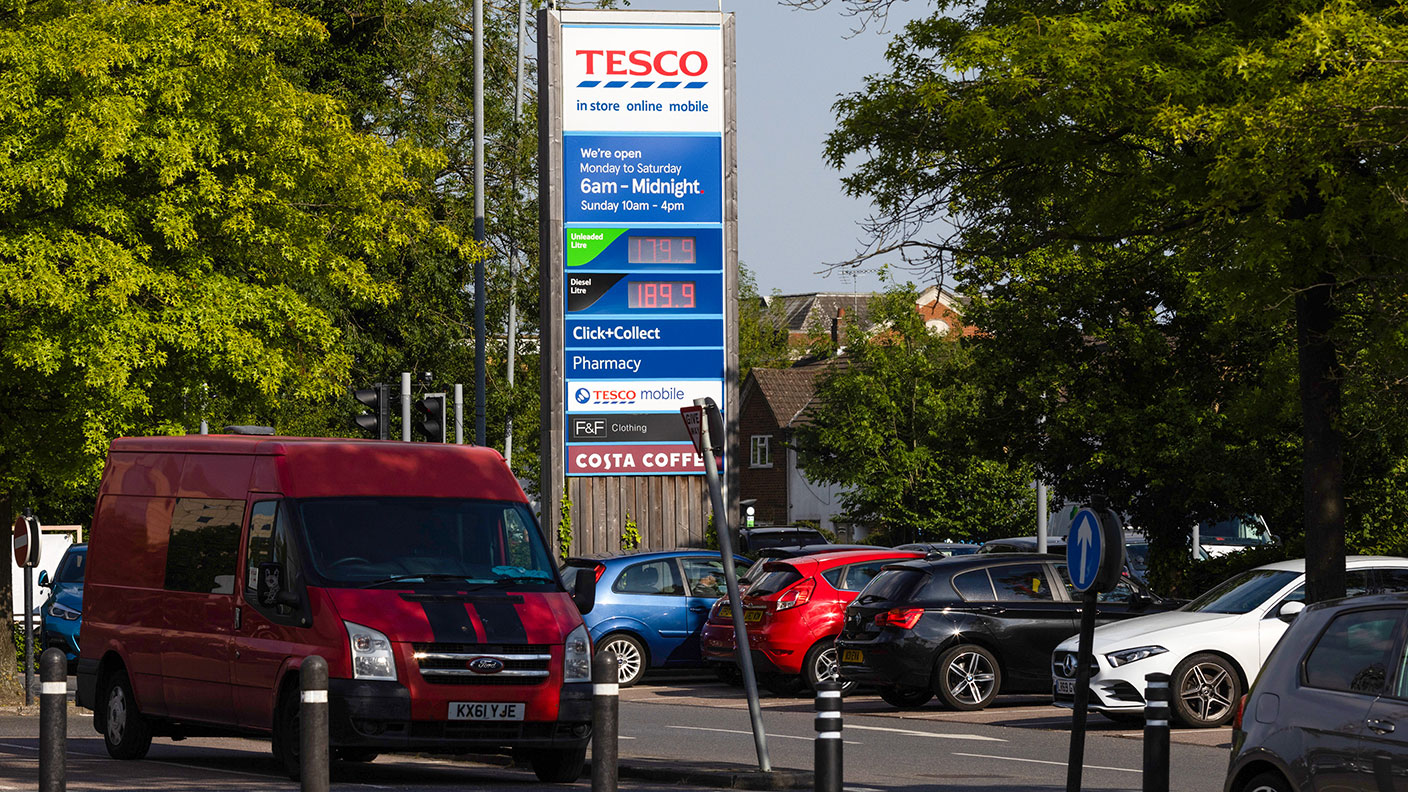 Why petrol prices are higher than in 2008, despite lower oil prices now
Why petrol prices are higher than in 2008, despite lower oil prices nowBriefings The price of petrol is at an all-time high. Yet despite oil prices being higher in 2008, petrol was cheaper back then. Saloni Sardana explains why.
-
 Why Australia’s luck is set to run out
Why Australia’s luck is set to run outCover Story A low-quality election campaign in Australia has produced a government with no clear strategy. That’s bad news in an increasingly difficult geopolitical environment, says Philip Pilkington